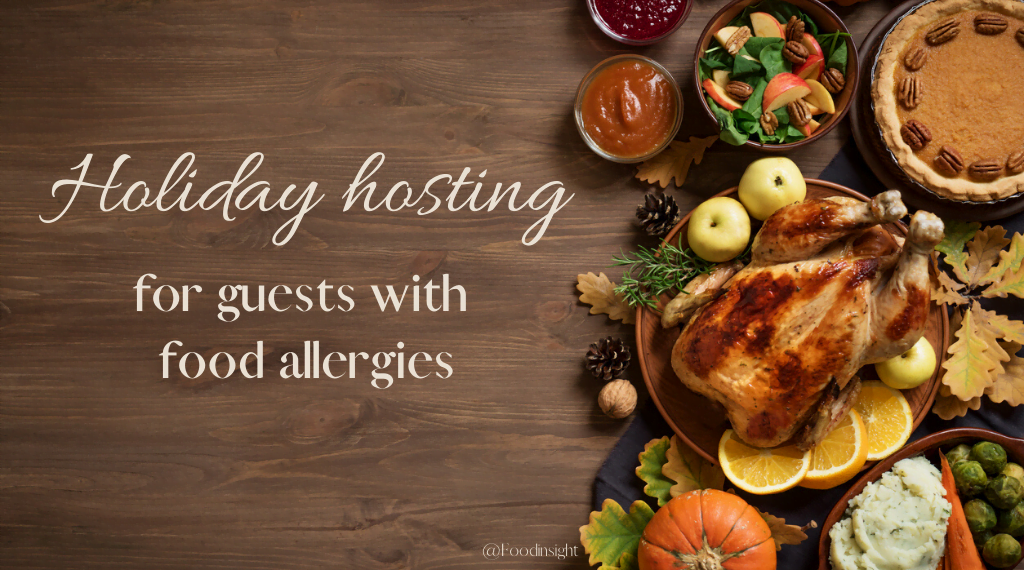A few years ago, I hosted my first Thanksgiving dinner, which turned into a wild scramble in my tiny apartment kitchen while I cooked a meal for seven. On top of all that, my sister-in-law was coming, and her wheat allergy made things a little trickier. Hosting a big meal for guests with food allergies can be challenging, especially when everyone is depending on you to make a safe, delicious, mistake-free meal. While I was fortunate to know which allergies to look out for in my cooking, sometimes guests show up without notice. My list of tips below can help keep your holiday dinners running smoothly, even if there’s an unexpected guest at your table. In fact, sometimes surprises give you an opportunity to get creative in the kitchen!
1. Offer allergy-free alternatives
Instead of scrapping a dish altogether, offer an allergen-free alternative dish to ensure everyone can enjoy a little of everything. For my family, stuffing is the big hit, but I knew we would need a wheat-free alternative for my sister-in-law. My solution: cornbread stuffing in addition to classic wheat bread stuffing. Here are some other ideas for adjusting popular side dishes: swap out cow’s milk for coconut milk in mashed potatoes; leave the walnuts on the side for the sweet potato casserole; and make a crust-less apple crisp instead of apple pie.
It’s also important to keep in mind that just because a dish is free of one allergen, it may still contain others. For example, while cornbread stuffing is free of wheat, it may still contain dairy products.
2. Keep allergen-containing foods separate
In an ideal world, we would have the space of a commercial kitchen to cook our holiday meals. My tiny city apartment was far from ideal. This meant being extra vigilant about separating food ingredients. While one of my top concerns was keeping raw turkey away from any ready-to-eat ingredients, separating out wheat products was also top-of-mind. To prevent cross-contact regardless of the size of your kitchen, be aware of which food ingredients pose the greatest risk to your guests, and make sure to prepare those separately.
3. Ask your guests ahead of time—even if you’ve known them forever
Allergies can develop as we age. Some kids “grow out” of some of their allergies, while adults can develop an allergy at an older age. You never know if something is a true allergy or not unless tested by a board-certified allergist. It’s always a good idea to check in with your guests, especially your older guests, in advance to see if anything new has arisen. Checking in also gives you an opportunity to see if there will be any additional guests. Maybe your brother is hoping to bring a plus-one or your niece recently started eating solid foods. Knowing who you are serving and how to serve them safely will have everyone coming back for seconds.
4. Ask for menu input ahead of time
Thanksgiving dinner has its classics—turkey, mashed potatoes, green beans, cranberry sauce—but some hosts like to shake it up with creativity once in a while. If you are hosting and plan to cook outside the classics, ask your guests for feedback before you cook the meal. A recipe might sound awesome to you, but you may have overlooked an ingredient that could trigger an allergic reaction. Even with the classics, it’s a good idea to double-check the recipes. When you’re cooking on autopilot with a dish you’ve been making for years, you may unknowingly toss in ingredients that could elicit an adverse reaction.
5. Label each food item
We can all assume what ingredients went into a dish, but assuming isn’t enough for a person with a food allergy. Start the trend of labeling the ingredients of all dishes. Go beyond just labeling the major food allergens that food manufacturers must label. State even the obvious ingredients, even sesame, since any person can be allergic to any food item. Added bonus: When guests ask for the recipe, there’s no extra digging for you to do since it’s sitting right in front of the dish!
6. Bring your own dish if you have a food allergy
If you have a severe food allergy and are invited to a holiday meal, offer to bring a dish of your own. A simple way to reduce the risk of potential cross-contact of allergens is to prepare your own food. This is also a great way to thank your host, take some of the cooking burden off them and share the responsibility for being mindful of food allergies.
Cooking for guests with food allergies can seem intimidating, especially if guests are traveling for the big meal, but simply paying closer attention can make a world of difference. Food Allergy Research and Education (FARE) also offers extra tips for navigating food allergies around the holidays. Follow these guidelines and you’re on your way to a safe and happy holiday season.
This blog post was written by Courtney Schupp, MPH, RD, our 2019 Sylvia Rowe Fellow, with contributions from Tony Flood and Marisa Paipongna.
